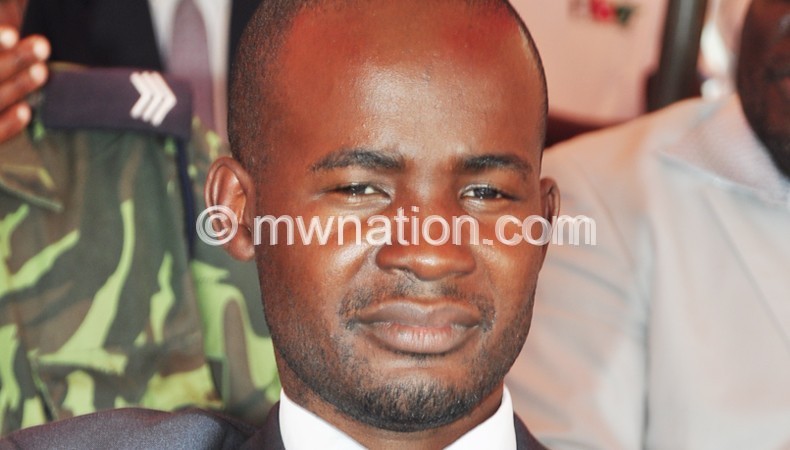Mwanamvekha brings bitter-sweet budget
Minister of Finance, Economic Planning and Development Joseph Mwanamvekha yesterday refused to blink as he tabled a K2.023 trillion 2020/21 National Budget which offers some lukewarm tax liberations and safety nets to Malawians in view of the Covid-19 pandemic.
But the new financial plan is far from cushioning and relieving Malawians from the pandemic and other economic shocks gripping Malawi, analysts say.

If anything, the budget—the second blueprint presented by Mwanamvekha as Finance Minister—appears to be defying economic realities on the ground, in an environment where real Gross Domestic Product (GDP) is projected at a meagre 1.9 percent in 2020, and with a recession looming fast, as a worst-case scenario come December 2020.
In fact, Mwanamvekha, given his limited fiscal space he is caged in, has also opted to be silent on minimum wage (which is static at K35 000), while also giving a blind eye to recent civil servants demands to promote at least a 6 000 of them who have been on the same lower grade for six years.
But the Finance minister has, however, expanded by 10 percent the tax-free band—from K45 000 to K50 000—a measure that has earned him praise by some economic commentators, with others describing it as “still too little to impact significantly on the welfare of Malawians”.
They argue that government has missed a golden opportunity to use the income tax measures as a tool for social protection for the working poor.

“The increase of income tax-free threshold under the personal income tax regime from K45 000 per month to K50 000 per month is too little to have any meaningful impact. This should have been looked at in the context of mitigating the adverse impact of the pandemic on the working poor Malawians,” said one socio-economic commentator Alex Nkosi yesterday.
The new budget represents a 9.9 percent increase over the 2019/2020 mid-year revised estimate of K1.84 trillion, but allocates a whopping K1.505 trillion to recurrent expenditure (representing 74.4 percent of the total expenditure), leaving development expenditure with K517.7 billion (25.6 percent of total expenditure), an increase from a 2019/2020 mid-year revised figure of K470.7 billion.

That alone has prompted other development economists we spoke to yesterday to dub the fiscal plan “a consumptive budget”.
“I don’t see any big differences from other shopping baskets we have had in the past. It is still a consumptive budget,” said economist Gowokani Chijere-Chirwa in an interview.
The budget projects domestic revenues amounting to K1.215 trillion. Of this amount, tax revenues are estimated at K1.152 trillion, representing 16.1 percent of GDP while other revenues have been estimated at K63.2 billion. That, too, is a toll order to achieve, considering how the 2019/20 budget revenue figures have underperformed, critics say.
Even Mwanamvekha yesterday swallowed his pride, by disclosing a brutal truth that on average, monthly tax revenue collections have dropped from K90.8 billion per month during pre-Covid-19 period to a monthly average of K59.1 billion during the Covid-19 period, representing a 35.0 percent drop.
Tellingly, businesses have slowed down and both tax and non-tax revenues have declined against increasing expenditure requirements.
Overall, fiscal balance in the budget emerges as another area of public concern as the budget deficit is projected to swell to K651.5 billion, and this is an equivalent of 9.1 percent of GDP or simply a third of the total budget.
Coming from a moderate deficit of K155.9 billion or 2.5 percent of GDP in the approved 2029/20 budget, the estimated deficit in the 2020/21 fiscal plan threatens to crowd-out private sector investment, increasing interest rates on the market, let alone piling more pressure on the already high public domestic debt stock—should Treasury resort to heavy borrowing, more especially from the domestic sources.
Mwanamvekha told the House that such a deficit will be financed by foreign borrowing amounting to K161.5 billion and domestic borrowing amounting to K490.0 billion.
Already, public debt interest payments have been projected at K376.0 billion in the budget, representing 5.3 percent of GDP. This, however, is an increase from K243.9 billion or 3.9 percent of GDP, according to Weekend Nation records.
And critics such as chairperson for Budget and Finance Committee of Parliament Sosten Gwengwe are also not amused with the ever-yawning budget deficit.
He said: “With statutory expenditures taking up almost 91 percent of the revenues, our deficits are spiraling out of control at close to K700 billion. We need to return to basics and try to leave within our means.”
In the budget, grants are estimated at K156.9 billion, representing 2.2 percent of GDP, comprising K26.5 billion from foreign Governments and K130.5 billion from international organizations in form of dedicated and project grants.
Likewise, in the budget, the wage bill has edged up with wages and salaries being projected at K493.1 billion, representing 6.9 percent of GDP.
This is an increase from a wage bill of K443 billion in the 2019/20 approved budget, our records show.
The minister justified that the increase has been made for recruitments in Ministry of Health, Malawi Police Service (MPS) and the Malawi Defence Force (MDF).
Macroeconomic assumptions:
Throughout his 57-page statement, the minister-who repeatedly admitted that the budget will be implemented in “a very difficult and uncertain environment” also assumes an average inflation rate of 9.9 percent during the fiscal year, a stable exchange rate of about K750 per US dollar, a Policy rate of 13.5 percent during the fiscal year, as well as a tax refunds at 1.5 percent of total tax revenue collection.
Malawi’s economic growth for the year 2019 was favourable despite the impact of the tropical cyclone Idai and the post-elections demonstrations following the May 2019 tripartite elections. The country attained real GDP growth rate of 5.1 percent, a remarkable improvement from 3.9 percent real GDP growth registered in 2018.





